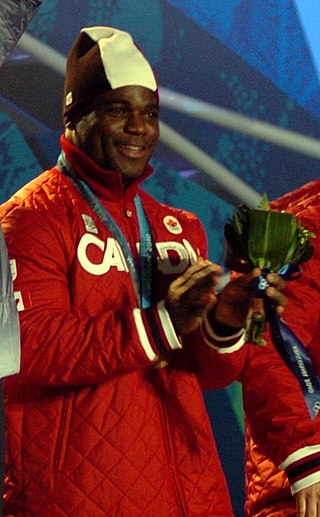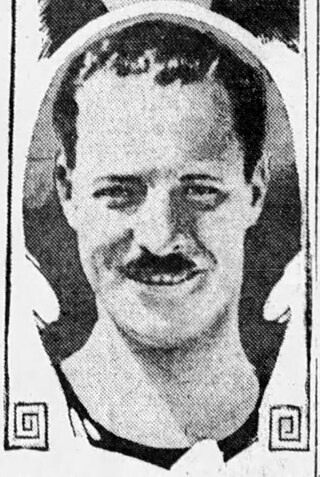
Bobsleigh or bobsled is a winter sport in which teams of 2 to 4 athletes make timed runs down narrow, twisting, banked, iced tracks in a gravity-powered sleigh. International bobsleigh competitions are governed by the International Bobsleigh and Skeleton Federation.

The 1932 Winter Olympics, officially known as the III Olympic Winter Games and commonly known as Lake Placid 1932, were a winter multi-sport event in the United States, held in Lake Placid, New York, United States. The games opened on February 4 and closed on February 13. It was the first time the Winter Games were held outside of Europe and the first of four Winter Olympics held in the United States; Lake Placid hosted again in 1980.
At the 1952 Winter Olympics, two bobsleigh events were contested. The two-man competition was held on Thursday and Friday, 14 and 15 February 1952 while the four-man competition was held on Thursday and Friday, 21 and 22 February 1952.
At the 1936 Winter Olympics, two bobsleigh events were contested. The competitions were held from February 11, 1936, to February 15, 1936.

Lascelles Brown is a Jamaican-born Canadian bobsledder who has competed for three countries since starting his career in 1999. Competing in three Winter Olympics, he is the first Jamaican-born athlete to win a Winter Olympic medal.

Trinidad and Tobago sent a delegation to compete at the 2002 Winter Olympics in Salt Lake City, United States from 8–24 February 2002. This was Trinidad and Tobago's third appearance at a Winter Olympic Games. The delegation consisted of three bobsledders, Gregory Sun, Andrew McNeilly, and Errol Aguilera. In the two-man competition, a four-run event in which all three men competed, they came in 37th place.

Jay James O'Brien was an American bobsledder who competed in the late 1920s and early 1930s. He won two medals at the Winter Olympics with a gold in the four-man event at Lake Placid, New York, in 1932 and a silver in the five-man event at St. Moritz in 1928. At 48 years old, he was the oldest Olympic champion.
Max Ludwig was a German bobsledder who competed in the early 1930s. He won the bronze medal in the four-man event at the 1932 Winter Olympics in Lake Placid and finished seventh in the two-man event at those same games. He was also a painter, and his work was part of the painting event in the art competition at the 1936 Summer Olympics.
Patrick Henry "Pat" Martin was an American bobsledder who competed in the late 1940s and early 1950s. He was born and lived in Massena, New York, 80 miles north of Lake Placid. Competing in two Winter Olympics, he won three medals with a gold and two silvers.
John Emery was a Canadian bobsledder who competed in the 1960s. He won a gold medal in the four-man event at the 1964 Winter Olympics in Innsbruck.

Horst Schönau is an East German bobsledder who competed in the late 1970s and early 1980s. He won a bronze medal in the four-man event at the 1980 Winter Olympics in Lake Placid.
Curtis Palmer Stevens was an American bobsledder who competed in the 1930s. He won the gold medal in the two-man event at the 1932 Winter Olympics in Lake Placid.
Sergio Zardini was an Italian bobsledder who competed from the late 1950s to the mid-1960s. He won the silver medal in the two-man event at the 1964 Winter Olympics in Innsbruck. He was born in Turin.

The Mt. Van Hoevenberg Olympic Bobsled Run is a venue for bobsleigh, luge and skeleton in the United States, located at the Lake Placid Olympic Sports Complex in Lake Placid, New York. This venue was used for the 1932 and 1980 Winter Olympics and for the only winter Goodwill Games in 2000. The track hosted both the first FIBT World Championships and FIL World Luge Championships held outside of Europe, doing so in 1949 and 1983. The third and most recent version of the track was completed in 2000. In 2010 the bobsled track was listed on the National Register of Historic Places.

Kaillie Humphries is a Canadian-American bobsledder. Representing Canada, she was the 2010 and 2014 Olympic champion in the two-woman bobsled and the 2018 Olympic bronze medalist with brakewoman Phylicia George. With her victory in 2014, she became the first female bobsledder to defend her Olympic title and was named flagbearer for the Olympic closing ceremony with brakewoman Heather Moyse.
Alexandru Ionescu was a Romanian bobsledder who competed in the 1930s. He was born in Bucharest.
For the 1932 Winter Olympics in Lake Placid, New York, United States, a total of five sports venues were used. This was unchanged from the previous games in St. Moritz. For the first time in the history of the Winter Olympics, an indoor venue was used for the figure skating and six of the twelve ice hockey events at the Olympic Arena. The first bobsleigh venue outside Europe was constructed for use. Four different 18 km and five different 50 km venues were submitted for approval prior to the Olympics. After the 1932 games, three of these venues served as host for their respective championships that were held outside Europe for the first time.

For the 1980 Winter Olympics in Lake Placid, New York, United States, a total of seven sports venues were used. All five of the venues used for the 1932 Winter Olympics were also used at the 1980 Winter Games with adjustments. These adjustments included electronic scoreboards, increased refrigeration, and the addition of a separate luge track. This was the last Winter Olympics where there were separate bobsleigh and luge tracks. The closest finish in Olympic history in cross-country skiing led skiing officials to time future events in hundredths of a second rather than tenths of a second. This would also apply to biathlon events. Eric Heiden won five gold medals at the speed skating oval while the "Miracle on Ice" took place between Americans and Soviets at the Olympic Center. In the late 1990s, the luge track was demolished and a new combination track was constructed in time for the only Winter Goodwill Games held. The sliding venue was named to the American National Register of Historical Places in February 2010.










